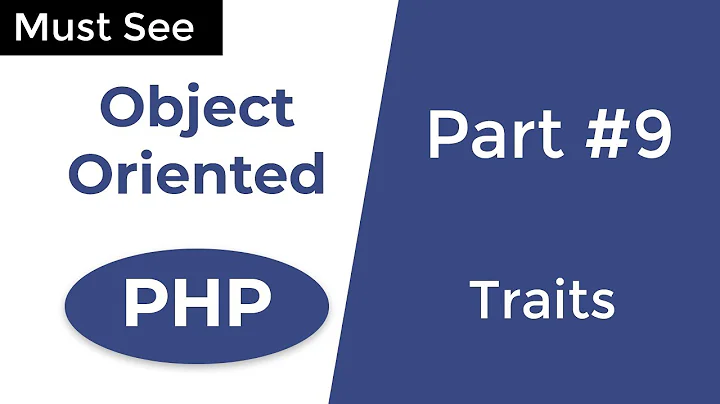PHP traits - change value of static property in inherited class
Solution 1
You can not reassign trait properties.
From PHP manual http://php.net/traits
See Example #12 Conflict Resolution
If a trait defines a property then a class can not define a property with the same name, otherwise an error is issued. It is an E_STRICT if the class definition is compatible (same visibility and initial value) or fatal error otherwise.
One solution would be to define override properties in the class
class Class2 extends BaseClass
{
protected static $_isCacheEnabled = true;
protected static $_cacheExpirationTime = 3600;
...
}
and then modify your trait as such...
trait Cacheable
{
protected static $isCacheEnabled = false;
protected static $cacheExpirationTime = null;
public static function isCacheEnabled()
{
if ( Cache::isEnabled() ) {
return isset( static::$_isCacheEnabled ) ? static::$_isCacheEnabled :
static::$isCacheEnabled;
} else {
return false;
}
}
public static function getCacheExpirationTime()
{
return isset ( static::$_cacheExpirationTime ) ? static::$_cacheExpirationTime :
static::$cacheExpirationTime;
}
}
Solution 2
You cannot override properties, but you can override functions. So one of the possible solutions, if you're going to use the properties as given, not changing them, could be:
trait Cacheable {
protected static function isCacheEnabledForClass() { return false; }
public static function isCacheEnabled()
{
return static::isCacheEnabledForClass() && Cache::isEnabled();
}
}
class Class2 extends BaseClass {
protected static function isCacheEnabledForClass() { return true; }
}
Related videos on Youtube
Comments
-
morgoth84 almost 2 years
So, this is my trait:
trait Cacheable { protected static $isCacheEnabled = false; protected static $cacheExpirationTime = null; public static function isCacheEnabled() { return static::$isCacheEnabled && Cache::isEnabled(); } public static function getCacheExpirationTime() { return static::$cacheExpirationTime; } }This is the base class:
abstract class BaseClass extends SomeOtherBaseClass { use Cacheable; ... }These are my 2 final classes:
class Class1 extends BaseClass { ... } class Class2 extends BaseClass { protected static $isCacheEnabled = true; protected static $cacheExpirationTime = 3600; ... }Here is the part of the code which executes these classes:
function baseClassRunner($baseClassName) { ... $output = null; if ($baseClassName::isCacheEnabled()) { $output = Cache::getInstance()->get('the_key'); } if ($output === null) { $baseClass = new $baseClassName(); $output = $baseClass->getOutput(); if ($baseClassName::isCacheEnabled()) { Cache::getInstance()->set('the_key', $output); } } ... }This code doesn't work because PHP complains about defining same properties in Class2 as in Cacheable. I can't set them in their constructors because I want to read them even before running the constructor. I'm open for ideas, any help would be appreciated. :)
EDIT:
Well, I use this Cacheable trait on several places so i kind of got mixed up. :) This works fine like this. But I have another class which directly uses the Cacheable trait and when I try to do this on that class, I get the metioned error. So... Just assume that the BaseClass isn't abstract and I'm trying to set these cache properties on it. The question remains the same.
-
morgoth84 over 10 yearsYeah, but this is ugly, I have 2 properties for the same thing. :/
-
goyote over 8 yearsNot 2 properties if you just have a default value in the statement
isset( static::$_isCacheEnabled ) ? static::$_isCacheEnabled : false;



![17. PHP Traits | Learn Object Oriented PHP [2021] | PHP OOP Tutorial Playlist](https://i.ytimg.com/vi/VjLNnVX5CkM/hq720.jpg?sqp=-oaymwEcCNAFEJQDSFXyq4qpAw4IARUAAIhCGAFwAcABBg==&rs=AOn4CLBINYxloBAYJ57NWAMJ4eyXn9GTSg)



